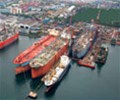

South Korea’s shipbuilding majors have shed some 1,500 jobs on their payrolls during the first half despite their record-breaking order book this year as higher commodity prices ate into their income while it usually takes couple of years for new orders to fatten their coffers.
Korea Shipbuilding & Offshore Engineering Co. (KSOE), Samsung Heavy Industries Co., and Daewoo Shipbuilding & Marine Engineering Co. (DSME) had a total of 378,845 employees on payrolls as of June 30, according to their first-half reports. The combined workforce count is about 1,500 fewer from a year-ago period.
The trio have continued cutting workforce under a cost-cutting program for the past several years in the wake of lengthy slump. This year was no exception even as they were blessed with the largest load of new orders in the first-half period since the industry’s heyday in 2008.
So far this year, KOSE, the largest shipbuilder in the world, has secured new contracts to build 196 vessels at $19.2 billion in the first six months, already surpassing its annual target by 30 percent.
Samsung Heavy Industries has won $7.1 billion worth of shipbuilding orders to date, meeting 78 percent of its target for this year.
DSME has achieved 82.2 percent of its annual target by bagging $6.3 billion worth of contracts.
Still they cannot afford to add workforce.
The three registered nearly 3 trillion won ($2.6 billion) in combined operating loss for the first half period, largely due to hikes in steel and other commodity prices. They recently signed an agreement with steel producers to pay around 1.1 million won per ton of steel plates from the second half versus around 800,000 won per ton charged in the first half. The shipbuilders in the second quarter made advance booking of the cost of steel plates, which generally make up around 20 to 30 percent of shipbuilding expense.
It would take several years for this year’s stellar orders to bolster their income.
Shipbuilders usually enter heavy tail contracts where they would receive the bulk sum of payment toward the final stage of delivery. It typically takes one to two years for shipbuilders to reflect earnings from new orders.
But the earnings prospects look up for the builders once the payments for high-value vessels running on green fuel come in.
On Tuesday, KSOE said in a regulatory filing that its subsidiary Hyundai Heavy Industries signed a 1.65 trillion won worth contract with Maersk to build eight large container vessels with a dual fuel engine that enables operation on methanol fuel as well as conventional low Sulphur fuel. The Korean shipyard has an option for four extra green vessels in 2025 after delivering the first eight by 2024.
Also, Clarkson Newbuilding Price Index, tracking price changes in newly built vessels, has jumped to 143.68 in July from 127.11 in January.
KSOE in a separate filing on Tuesday that Hyundai Samho Heavy Industries also won a contract to builds two liquefied petroleum gas (LPG) tankers at 196.5 billion won this month, which is much higher than a few months ago.
Source: Pulse